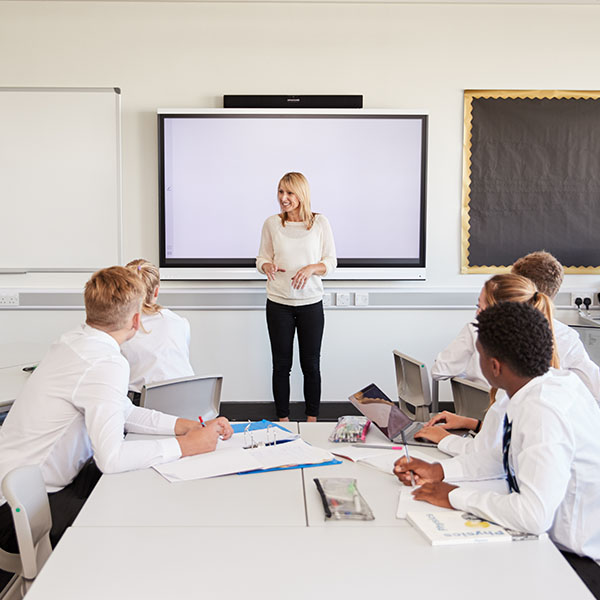When considering how to best help our students after this last lockdown, it’s important that we put their well-being at the heart of everything we do. Remembering their mental health, rather than focusing purely on learning outcomes, will be key.
You may have noticed students struggling a bit more this time round, compared to the last lockdown. Although students were more familiar and experienced with distance learning, the difficulties associated with lockdown have built up and perhaps overwhelmed some. Students’ resilience really has been tested to the limits.
Returning to school and facing the next few months will be a challenge in itself. So, how can we grow back student resilience after all these months of lockdown? To help them now and to move forward positively?
Stay healthy
Being physically and mentally healthy is one of the best ways to boost resilience, helping students to respond well under pressure and during adversity. So, we should be encouraging students to get active, as well as to do things they enjoy, to keep their bodies and minds healthy.
In this key study, researchers found 3 key things that help students to be resilient, one of which was staying healthy. The other two were having social support and maintaining perspective, which we’ll take a look at now.
Boost social support
Strong social relationships are always important, but especially now, after months of lockdown. Maintaining good relationships with friends, family and teachers plays a big part towards resilience. It helps students either feel better about their setbacks and problems or provides suggestions on how to overcome them.
To combine this with the last point, playing team sports (when allowed) is a great idea, getting students physically active whilst providing social interaction, and giving students something to focus on other than school and current stresses. As experts in child development are advocating, students should be spending the next few months being physically active, getting outside, and having fun with friends, rather than sitting through longer school hours and summer schools.
And finally, it’s not only friend relationships that are important to re-build, but teacher relationships too. To grow back student resilience, teachers can help by working hard on their relationships with students at the return to school. This will help them to feel more comfortable and relaxed in the learning environment, and make them more likely to ask for help and feedback when they need it.
Maintain Perspective
Students will flourish and cope well under the pressures of returning to school if they can keep things in perspective. This is defined as the ability to manage one’s emotions, concentrating on the things that you can control and that matter, and choosing the correct strategy for any given situation.
Teachers can help students to maintain perspective at this overwhelming time by portraying a calm and level-headed view of the current situation. Yes, students may have fallen behind, and yes this is a tough time, but the difficulties students face at the moment do not have to define neither themselves nor their future successes.
You can also help students to keep a sense of perspective by encouraging them to set both short- and long-term goals. Focusing on the here and now short-term goals helps maintain focus and concentration, while the end goal helps students to maintain motivation on tough days and through setbacks. We can even help you do this, with these printable goal setting worksheets.
Teach positive and helpful self-talk
There is a strong research base that suggests that how you talk to yourself impacts your level of resilience, how confident you feel and how well you perform under pressure. A review found strong evidence that talking to yourself in an instructional manner (i.e. telling yourself what you would do differently) helps you focus on what to do next, instead of dwelling on the problem.
So, teachers can help their students to grow back resilience through teaching them the power of positive self-talk. This should include challenging negative thoughts, avoiding use of absolutes and phrases such as ‘I can’t’. Instead, we should encourage students to use positive and energising language to convince themselves that they can and will get through this. Self-reflection in the form of self-talk can also help students to maintain perspective, which we know can be an important grounding factor under challenging situations.
Believe in them
Finally, a very potent thing teachers can do to strengthen students’ resilience is to believe in them and reinforce the belief that they will overcome the challenges they’ve experienced through the pandemic. For example, the Pygmalion Effect teaches us the power of someone believing in you. It shows that having high expectations of someone leads to them performing better and meeting those expectations. Believing in students can also give them a sense of hope, helping them to believe ‘they can do it’ too, helping them to cope under pressure and challenges.
Alongside your expectations, at this time it will be very important to be flexible and understanding with your students. Given the challenges they have faced over the last few months, they’re likely to experience some ups and downs when returning to school. So, it will be key to be accommodating and supportive through this time, to help nurture students’ resilience.
FINAL THOUGHTS
After months of lockdown, students may have lost some of the resilience they need to help them return to school and thrive over the following months. Growing back students’ resilience is so important because it is likely to underpin how happy they feel and their well-being, as well as their ability to learn and perform. Teachers can play a huge part in promoting student resilience after lockdown, so we hope you find these tips helpful in doing so.
For more about the upcoming return to school, have a read of our blog on how retrieval practice can help your students after lockdown.







